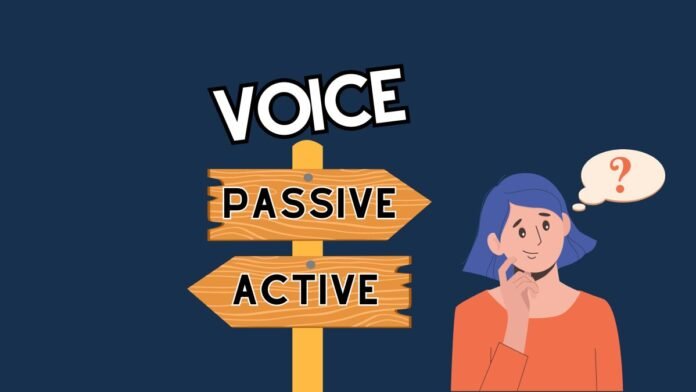PASSIVE VOICE TABLE OF CONTENT
- What Is Passive Voice?
- What is passive and active voice?
- Examples of passive voice
- How to identify the passive voice in writing
- How do you change active to passive?
- Passive voice exercises
What is Passive Voice?
In writing and grammar, passive voice is a grammatical construction that allows us to make the object of a sentence into the subject. In addition, it allows us to avoid specifying who or what is performing an action. For example, in the passive voice sentence, “The ball was thrown,” the object (the ball) has become the subject, and we do not know who threw it. But when we use the active voice to say “he threw the ball,” we can identify the person who performed the action, unlike the passive voice.
What is passive and active voice?
Active voice is a grammatical construction in which the subject of a sentence performs the action of the verb. For example, in the sentence “John wrote the book,” John is the subject and he performs the action of writing the book.
Passive voice is a grammatical construction in which the subject of a sentence receives the action of the verb. For example, in the sentence “The book was written by John,” the book is the subject receiving the action of being written, and John is the object or agent performing the action.
In short, active voice emphasizes the doer of the action, while passive voice emphasizes the receiver of the action. Knowing how to effectively use both active and passive voice can help writers convey meaning clearly and with greater impact.
Examples of Passive Voice
- The cake was baked by my sister.
- The flowers were arranged beautifully by the florist.
- The cake was being eaten by my sister.
- The car had been driven by John to the store.
- The book will be written by the famous author.
- The movie has been directed by a famous film director.
- The house would have been built by a team of skilled workers.
- The letter is being sent by the post office.
- The park service will be cleaning the beach.
How to identify the passive voice in writing
You can look for specific clues that will assist you in identifying the passive voice in writing. Here are some warning signs to watch out for:
- Use of the “to be” verb: The passive voice often uses a form of the “to be” verb, such as “is,” “was,” “were,” “been,” or “being.” For example, “The ball was thrown by John” is in the passive voice.
- Absence of an explicit subject: In passive voice constructions, the subject of the sentence is often absent or less prominent than the object. For example, “The cake was eaten” is in the passive voice, and the sentence’s subject is not identified.
- Use of prepositions: Passive voice constructions may use prepositions such as “by,” “with,” or “from” to indicate the agent performing the action. For example, “The painting was created by a famous artist” is in the passive voice.
- Emphasis on the object: In passive voice constructions, the object of the sentence is often emphasized more than the subject or agent. For example, “The prize was won by the underdog team” emphasizes the prize rather than the team that won it.
How do you change active to passive?
To change active to passive? we need to understand two things:
- Sentence order.
- The rule of passive voice.
Now let’s delve into explaining more what is said before.
1. Sentence order
Consider these changes in the table below:
| ACTIVE | PASSIVE | ||||
| Subject (1) | Verb (2) | Object (3) | Object (3) | Verb (2) | Subject (1) |
| Tom | Speaks | English | English | is spoken | by Tom |
| The students | wrote | the lesson | the lesson | was written | by students |
| My dad | is reading | a newspaper | a newspaper | s being read | by my dad |
As you may have noticed, the structure of the active is different from the passive in this way:
- Active: Subject + Verb + object
- Passive: Object + verb + subject
You may also have noticed that the verb form in the active structure is different from the passive, and this is our next step in understanding how to change active to passive.
2. The rule of passive voice
The verb form in the passive sentence is written this way:
BE + Past participle
Important: (Be) takes the tense or time of the verb in the active form.
The following table shows the different tenses in the active and passive forms, with sentences as examples:
| Tenses | Active | Passive |
| simple present | Leila feeds an animal | an animal is fed by Leila |
| present continuous | Leila is feeding an animal | an animal is being fed by Leila |
| present perfect | Leila has fed an animal | an animal has been fed by Leila |
| simple past | Leila fed an animal | an animal was fed by Leila |
| past continuous | Leila was feeding an animal | an animal was being fed by Leila |
| past perfect | Leila had fed an animal | an animal had been fed by Leila |
| the simple future | Leila will feed an animal | an animal will be fed by Leila |
| future perfect | Leila will have fed an animal | an animal will have been fed by Leila |
| modal verbs | Leila can feed an animal | an animal can be fed by Leila |
Passive Voice Exercises
A. REWRITE THESE SENTENCES BEGINNING WITH THE WORDS GIVEN.
1. They will build a new library in our neighborhood.
A new library …………………..
2. The government has built new hotels to attract tourists.
New hotels ……………..
3. They decorated Nancy’s room with balloons and flower
Nancy’s room with balloons and flowers………………………..
4. The government has implemented a new educational system.
A new educational system………………………
5. The committee selected two films for an international festival.
Two films …………………………………………
6. Muslims celebrate Aid Alfitr on the first of Chaoual.
Aid Alfitr …………………………
7. Local authorities should take measures to protect our environment from pollution.
Measures to protect our environment from pollution………………
8. Candidates mustn’t use mobile phones during the exam.
Mobile phones ………………………
9. Parents shouldn’t keep medicines within children’s reach.
Medicines …………………………
10. The government should take measures to reintegrate street children into society.
Measures ……………………………
Answers
- A new library will be built in our neighborhood by them.
- New hotels have been built by the government to attract tourists.
- Nancy’s room with balloons and flowers was decorated by them.
- A new educational system has been implemented by the government.
- Two films were selected by the committee for an international festival.
- Aid Alfitr is celebrated by Muslims on the first of Chaoual.
- Measures to protect our environment from pollution should be taken by local authorities.
- Mobile phones mustn’t be used by candidates during the exam.
- Medicines shouldn’t be kept within children’s reach by parents.
- Measures should be taken by the government to reintegrate street children into society.





HI guys I am english departement student and I need help does anyone know a website or anybook I can benifit from it in m studies because I face lot of problemes in this branch spesificly in the grammar please
My dear teacher Kabul
It is my pleasure to read and learn from your great work. It is beneficial for both students and teachers.
Wish you all the best
Sadik
It is actually a great job you are doing for both teachers and students. I would rather be grateful if you suggest efficient but simple ways to write essays of different types. I am saying this, Mr Nabil, since most of our students have srious problems with writing skills.Cordially.Redouane El yousfi, a teacher of English in middle school.
Dear Redouane.
Thank you for your feedback. I will surely do what you have suggested.
thank you
Thanks a lot for all the efforts you are making to help both teachers and students with materials and useful resources. I have gone through some lessons and they are really helpful. Cncerning he rules for the passive, I would recommend that you add rules related to the passivization of structures with ‘be going to”, and modal verbs. I generally give my students two rules concerning modal constructions: modal + Verb (infinitive) which becomes Modal + be + PP (this embraces the rule for the future simple; so, I don’t add a seperate rule for that ) and Modal + have + pp , which becomes M+ have been + pp (and this again englobes all the modals referring to the past : should have… , could have…, may have …. , and not simply the future perfect) . There are also rules for the impersonal passive (It is said that …)
Hope you will find these remarks useful.
Congrats again on the quality of your work .
All the best,
Ikram
EFL Teacher,
Kénitra
Thank you, dear respected teacher, for your remarks. I will update the post accordingly.
Bests then